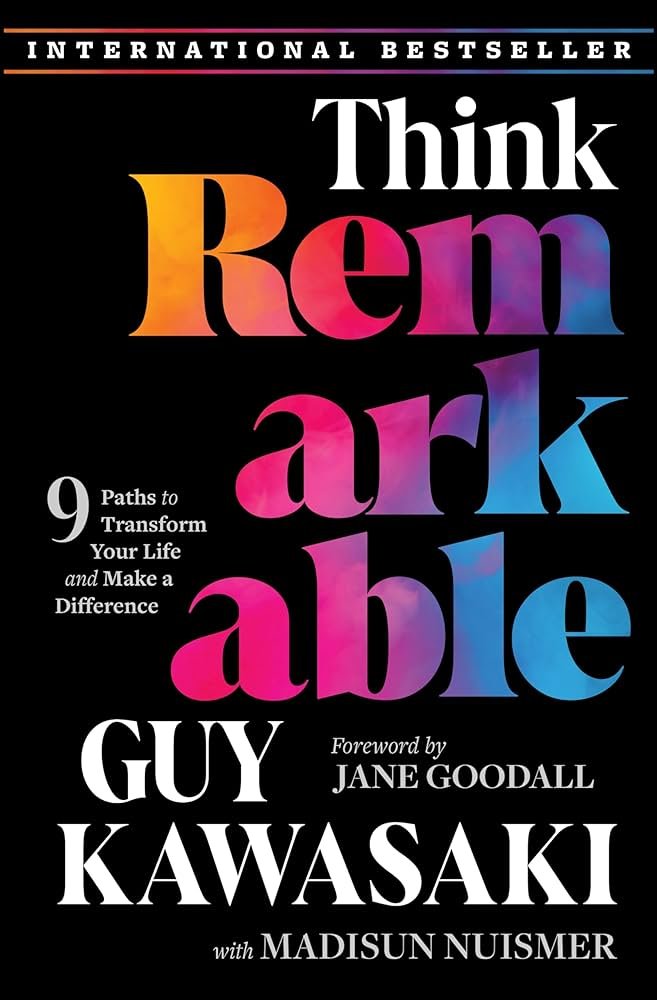Think Remarkable by Guy Kawasaki
Date read: 6/2/24. Recommendation: 5/10.
Guy shares lessons from some of the great entrepreneurs, leaders, and thinkers (from his podcast) to explore how we might make a difference and live remarkable lives of our own. I enjoyed the unconventional approach to pursuing new ideas (focus on defining a subcategory, not an entirely new category), starting with simple questions, gaining first-hand knowledge, and embracing a growth mindset along the way. The recommended additional reading at the end of each chapter also offers an exceptional curated list of books if you want to source out some new material. The big drawback is that it doesn’t feel so much like a book as it does a summary of his podcast without adding anything new or original. Check out my notes below or Amazon for details and reviews.
My Notes:
Remarkable:
Being remarkable = how you transform your life and the world.
This is built upon growth (build your foundation), grit (implement your aspirations), and grace (uplift and inspire).
“A remarkable individual is someone who has committed to an outcome in spite of the odds or the circumstances. They revisit that goal every moment they can. Even if it’s not physically doing something, they’re thinking about it. They’re envisioning it. They have the audacity to love themselves enough to constantly re-mark, re-put that mark on their sight, on their heart, on their soul, on their tongue, on their limbs, to work towards something that most people can’t see. That’s remarkable.” Halim Flowers
Growth mindset:
“What a wonderful thought it is that some of the best days of our lives haven’t happened yet.” Anne Frank
A fixed mindset is what keeps people trapped in comfort and convenience, instead of trying something new or embracing the obstacles in their path. See Carol Dweck’s Mindset for an overview of fixed vs. growth mindsets.
“Growth and comfort never coexist.” Ginni Rometty
Does this path have a heart?
“You can’t connect the dots looking forward. You can only connect them looking backward. So you have to trust that the dots will somehow connect in your future. You have to trust in something, your gut, destiny, life, karma, whatever, because believing that the dots will connect down the road will give you the confidence to follow your heart even when it leads you off the well-worn path and that will make all the difference.” Steve Jobs
Building wisdom:
Reading: “Reading is a form of alchemy because it changes us…It can transport us to places that we haven’t been before. It can give us experiences that we wouldn’t have otherwise, and then those experiences become part of us.” Elizabeth Gruner
The power of first-hand knowledge: Toyota has a principle of “genchi genbutsu” (go and see for yourself) which tells people to get their hands dirty, see the factory floor, visit dealers, spend time with customers when they’re using the vehicles. Similar to product discovery, it’s a super power and helps you build an appreciation for the people doing the work or using the product.
Lower the stakes:
Your purpose and your passion are high bars to start with. Lower the stakes. “In reality, it can take years to find your passion—indeed ‘find’ is the wrong word because it implies that once you find something, the process is over. Truly, you develop your passions—it’s rarely love at first sight.” Guy Kawasaki
Forget building a new category. Focus on a subcategory (e.g. Tesla defining an electric subcategory in cars, GoPro with action cameras, etc.).
You want to be a large fish in a large pond.
“It’s cheaper to create a niche within a category because people have a basic understanding of what you do. It is easier to explain a Kindle e-reader as a subcategory of tablets than as a totally new market.” Guy Kawasaki
Focus on simple questions:
“Remarkable people don’t usually start with grandiose plans of crushing or dominating the universe. They start with small and simple questions that over time yield the result of making a difference: Isn’t this strange? Is there a better way? Why has no one done this before?” Guy Kawasaki
Identify assumptions that represent gaps and flaws in the status quo.
Encourage a broader range of curiosity and collaboration.
Reframe how people view problems by simplifying complicated issues.
Tell good stories:
“Be authentic. Good stories ring true and do not require ungodly leaps of faith. They align with your product or service and provide substance to your marketing and branding.” Guy Kawasaki
Hire people smarter than you:
Benefits: expansion of knowledge and skills, enhanced decision-making, deeper and better team, high-performance culture. A players attract A players.
Expand your perspective:
Ask yourself this question: “At the end of my life, am I going to wish I did more ___ or more ____?”
Types of regrets:
Via Daniel Pink: Foundation regrets (exercise, wellness, savings), boldness regrets (inaction), connection regrets (relationships), moral regrets.
Other lessons from Guy’s parents:
Still waters run deep: “Don’t create a ruckus. Don’t hassle people. Don’t try to teach people a lesson.” Guy Kawasaki
Don’t be cheap: “Don’t negotiate just to exercise your power. Let people make a profit and a living.” Guy Kawasaki

